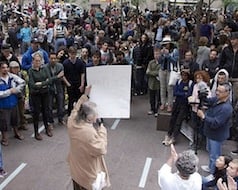 While the “Occupy Wall Street” movement offers little in the way of a coherent message, it tends to demonize corporations (while using myriad corporate products to organize the protests), demand more political handouts and economic controls, and attack capitalism. Once in a while, though, the “occupiers” offer a tidbit that, if placed in the right context, offers something resembling good advice. Such is the case with a message by an “Occupy Wall Street” supporter posted online: “In 1776 we separated our government from England. In 2012 we will separate government from the corporations.” What does it mean to “separate government from the corporations,” and how is that actually accomplished?
While the “Occupy Wall Street” movement offers little in the way of a coherent message, it tends to demonize corporations (while using myriad corporate products to organize the protests), demand more political handouts and economic controls, and attack capitalism. Once in a while, though, the “occupiers” offer a tidbit that, if placed in the right context, offers something resembling good advice. Such is the case with a message by an “Occupy Wall Street” supporter posted online: “In 1776 we separated our government from England. In 2012 we will separate government from the corporations.” What does it mean to “separate government from the corporations,” and how is that actually accomplished?
Government should be separated from corporations in precisely the same sense in which it should be separated from religion. Just as government should respect the rights of individuals to profess the ideas they want and voluntarily organize into religious and ideological movements, so government should respect the rights of individuals to produce what they want and organize into corporations. Government should treat people in religious groups and corporations just as it should treat everyone else, intervening only to protect people’s rights. Government should step in to resolve contract disputes, whether involving a pastor or a CEO, and to prevent any person or group from violating the rights of others, whether that involves religious violence or a business stealing trade secrets. Beyond the basic role government properly plays in protecting individual rights, government should remain separated from churches as it should remain separated from corporations. What changes would that require in today’s America?
First, government should stop interfering with businesses activities (except to prevent force and fraud and to resolve contract disputes). Separation is a two way street. Government cannot be separated from corporations until corporations are separated from government. When politicians seek to “regulate” businesses, they necessarily invite corporate lobbyists to the political table. As P. J. O’Rourke says, “When buying and selling are controlled by legislation, the first things to be bought and sold are legislators.” Some businesses seek to manipulate the political rules to squash competitors; others simply try to mitigate the political damage to their ability to produce. When politicians (and their left-wing supporters) seek to control auto fuel standards, business mergers, radio and television broadcasts, the production of medical supplies, licensing for interior decorating, and a million other details of business, those politicians necessarily involve corporations in government.
Second, government should stop subsidizing corporations. When politicians support George W. Bush’s “bailouts,” Barack Obama’s “stimulus” spending, or “green energy” subsidies, those politicians necessarily create corrupt relationships between business and government. Genuine capitalism involves strictly voluntary transactions, not forced wealth transfers. Today’s mixed economy of “corporatism” or “crony capitalism” is not capitalism at all. Unfortunately, many in the “Occupy Wall Street” crowd advocate more government involvement in corporations, not less.
Third, government should stop taxing corporations. It is true, as the left incessantly cries, that “corporations aren’t people.” Corporations, like churches and families and political movements, are composed of individual people, each of whom has rights. It is simply unfair to tax individuals twice, once as a member of a corporation and then as an individual. If the government would simply stop taxing corporations, that would remove all incentive for corporations to seek special tax loopholes.
Fourth, government should respect the free-speech rights of individuals who compose corporations. Unfortunately, when activists on the left say they want to limit corporate influence in government, often they mean they want government to forcibly muzzle the free speech of the individuals who form a corporation. But corporate speech, no less than religious speech, should be separated from government controls. The solution to preventing undue corporate influence in politics is not to trample the First Amendment, but instead to establish a truly free market in which government neither subsidizes businesses nor controls their activities.
Members of the “Occupy Wall Street” movement should be careful. If they logically think through their goal to “separate government from the corporations,” ultimately they will end up championing capitalism. And then they might decide that Pennsylvania Avenue offers a more appropriate center for a protest.
Like this post? Join our mailing list to receive our weekly digest. And for in-depth commentary from an Objectivist perspective, subscribe to our quarterly journal, The Objective Standard.
Related:
Image: Wikipedia Commons










